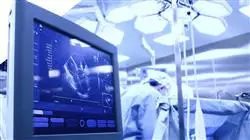University certificate
The world's largest faculty of nursing”
Introduction to the Program
Thanks to this Professional master’s degree you will learn about the advantages of E-Health and Big Data applied to the healthcare sector”

Although biomedicine is one of the most remarkable discoveries in the medical field, the truth is that new technologies have made it possible to implement informatics in patient rehabilitation processes. From the massive processing of data for research into rare diseases, to applications that allow the monitoring of patients with serious pathologies or even those that monitor blood sugar levels in patients with diabetes. These are advances that have brought significant improvements in the daily lives of those affected and also in their family environment.
The cost-effective and safe use of technologies, as designated by the WHO, is reflected in the concept of eHealth. Major scientific developments have also incorporated key tools for the development of healthcare treatments. Moreover, thanks to innovation in healthcare centers, it has been possible to improve clinical management and optimize healthcare services. TECH Global University's main objective is to boost the career of graduates who wish to increase their skills in the technological health service and are interested in the simultaneous development of telemedicine.
This program addresses the theoretical-practical foundations of modern medicine to generate a global and deep vision of the new biomedical incorporations. Additionally, this program delves into bioprinting, biomedical imaging and the possibilities offered by artificial intelligence in pattern recognition in medical images.
TECH Global University has proposed this study with the collaboration of expert teachers in the health area and, in addition, instruct the specialists with their real experiences in the field of action. This is an innovative and 100% online degree, which applies the Relearning, methodology, so that nurses do not have to spend long hours memorizing the syllabus, but are able to assimilate it in a progressive and simple way. All this, so that the specialist integrates the E-Health tools in his profession and collaborates in its development.
Don't wait any longer, distinguish yourself as a specialist in a sector that has already incorporated E-Health platforms to personalize the healthcare service”
This Professional master’s degree in E-Health and Big Data contains the most complete and up-to-date scientific program on the market. The most important features include:
- Practical cases presented by experts in Information and Communication Technology focused on the healthcare services
- The graphic, schematic, and practical contents with which they are created, provide scientific and practical information on the disciplines that are essential for professional practice
- Practical exercises where the self-assessment process can be carried out to improve learning
- Its special emphasis on innovative methodologies
- Theoretical lessons, questions to the expert, debate forums on controversial topics, and individual reflection assignments
- Content that is accessible from any fixed or portable device with an Internet connection
Boost your career thanks to bioinformatics computing and Big Data techniques, so that you master all fields of the healthcare area”
The program’s teaching staff includes professionals from the sector who contribute their work experience to this educational program, as well as renowned specialists from leading societies and prestigious universities.
Its multimedia content, developed with the latest educational technology, will allow professionals to learn in a contextual and situated learning environment, i.e., a simulated environment that will provide immersive education programmed to prepare in real situations.
The design of this program focuses on Problem-Based Learning, by means of which professionals must try to solve the different professional practice situations that are presented to them throughout the academic year. For this purpose students will be assisted by an innovative interactive video system developed by renowned experts.
With this program you will understand the importance of massive data processing against epidemiological diseases”

Join the change in eHealth by applying artificial intelligence and the Internet of Things (IoT) to telemedicine”
Why study at TECH?
TECH is the world’s largest online university. With an impressive catalog of more than 14,000 university programs available in 11 languages, it is positioned as a leader in employability, with a 99% job placement rate. In addition, it relies on an enormous faculty of more than 6,000 professors of the highest international renown.

Study at the world's largest online university and guarantee your professional success. The future starts at TECH”
The world’s best online university according to FORBES
The prestigious Forbes magazine, specialized in business and finance, has highlighted TECH as “the world's best online university” This is what they have recently stated in an article in their digital edition in which they echo the success story of this institution, “thanks to the academic offer it provides, the selection of its teaching staff, and an innovative learning method aimed at educating the professionals of the future”
A revolutionary study method, a cutting-edge faculty and a practical focus: the key to TECH's success.
The most complete study plans on the university scene
TECH offers the most complete study plans on the university scene, with syllabuses that cover fundamental concepts and, at the same time, the main scientific advances in their specific scientific areas. In addition, these programs are continuously being updated to guarantee students the academic vanguard and the most in-demand professional skills. In this way, the university's qualifications provide its graduates with a significant advantage to propel their careers to success.
TECH offers the most comprehensive and intensive study plans on the current university scene.
A world-class teaching staff
TECH's teaching staff is made up of more than 6,000 professors with the highest international recognition. Professors, researchers and top executives of multinational companies, including Isaiah Covington, performance coach of the Boston Celtics; Magda Romanska, principal investigator at Harvard MetaLAB; Ignacio Wistumba, chairman of the department of translational molecular pathology at MD Anderson Cancer Center; and D.W. Pine, creative director of TIME magazine, among others.
Internationally renowned experts, specialized in different branches of Health, Technology, Communication and Business, form part of the TECH faculty.
A unique learning method
TECH is the first university to use Relearning in all its programs. It is the best online learning methodology, accredited with international teaching quality certifications, provided by prestigious educational agencies. In addition, this disruptive educational model is complemented with the “Case Method”, thereby setting up a unique online teaching strategy. Innovative teaching resources are also implemented, including detailed videos, infographics and interactive summaries.
TECH combines Relearning and the Case Method in all its university programs to guarantee excellent theoretical and practical learning, studying whenever and wherever you want.
The world's largest online university
TECH is the world’s largest online university. We are the largest educational institution, with the best and widest online educational catalog, one hundred percent online and covering the vast majority of areas of knowledge. We offer a large selection of our own degrees and accredited online undergraduate and postgraduate degrees. In total, more than 14,000 university degrees, in eleven different languages, make us the largest educational largest in the world.
TECH has the world's most extensive catalog of academic and official programs, available in more than 11 languages.
Google Premier Partner
The American technology giant has awarded TECH the Google Google Premier Partner badge. This award, which is only available to 3% of the world's companies, highlights the efficient, flexible and tailored experience that this university provides to students. The recognition as a Google Premier Partner not only accredits the maximum rigor, performance and investment in TECH's digital infrastructures, but also places this university as one of the world's leading technology companies.
Google has positioned TECH in the top 3% of the world's most important technology companies by awarding it its Google Premier Partner badge.
The official online university of the NBA
TECH is the official online university of the NBA. Thanks to our agreement with the biggest league in basketball, we offer our students exclusive university programs, as well as a wide variety of educational resources focused on the business of the league and other areas of the sports industry. Each program is made up of a uniquely designed syllabus and features exceptional guest hosts: professionals with a distinguished sports background who will offer their expertise on the most relevant topics.
TECH has been selected by the NBA, the world's top basketball league, as its official online university.
The top-rated university by its students
Students have positioned TECH as the world's top-rated university on the main review websites, with a highest rating of 4.9 out of 5, obtained from more than 1,000 reviews. These results consolidate TECH as the benchmark university institution at an international level, reflecting the excellence and positive impact of its educational model.” reflecting the excellence and positive impact of its educational model.”
TECH is the world’s top-rated university by its students.
Leaders in employability
TECH has managed to become the leading university in employability. 99% of its students obtain jobs in the academic field they have studied, within one year of completing any of the university's programs. A similar number achieve immediate career enhancement. All this thanks to a study methodology that bases its effectiveness on the acquisition of practical skills, which are absolutely necessary for professional development.
99% of TECH graduates find a job within a year of completing their studies.
Professional Master's Degree in E-Health and Big Data
The Professional Master's Degree in E-Health and Big Data is an academic program specializing in the integration and use of information technology in the world of healthcare. This Professional Master's Degree is designed for healthcare and informatics professionals who wish to enhance their understanding of this exciting and rapidly growing area. The healthcare industry is changing rapidly and innovators must be at the forefront of the evolution. This program explores the latest advances in information technology and how they are being used in healthcare. Students will learn the fundamentals of Big Data and data analytics and their practical application in healthcare. The goal of this Professional Master's Degree is to encourage the use of technological innovations in healthcare in order to improve the quality of patient care and achieve more efficient and cost-effective care. Participants will learn the fundamental concepts of medical informatics, including topics such as information security, decision making and project management.
Why study at TECH?
TECH Global University is ranked by Forbes as the best digital university in the world, thanks to its 10,000 university degrees in 10 different languages, many of them under 100% online modality so that more students in the world live the TECH experience. In short, the Professional Master's Degree in E-Health and Big Data is a challenging and innovative academic program that is designed to prepare students to work in the healthcare and information technology sector, fostering the use of emerging technologies to improve access and quality of healthcare. Enroll today and join the next generation of healthcare technology leaders!







